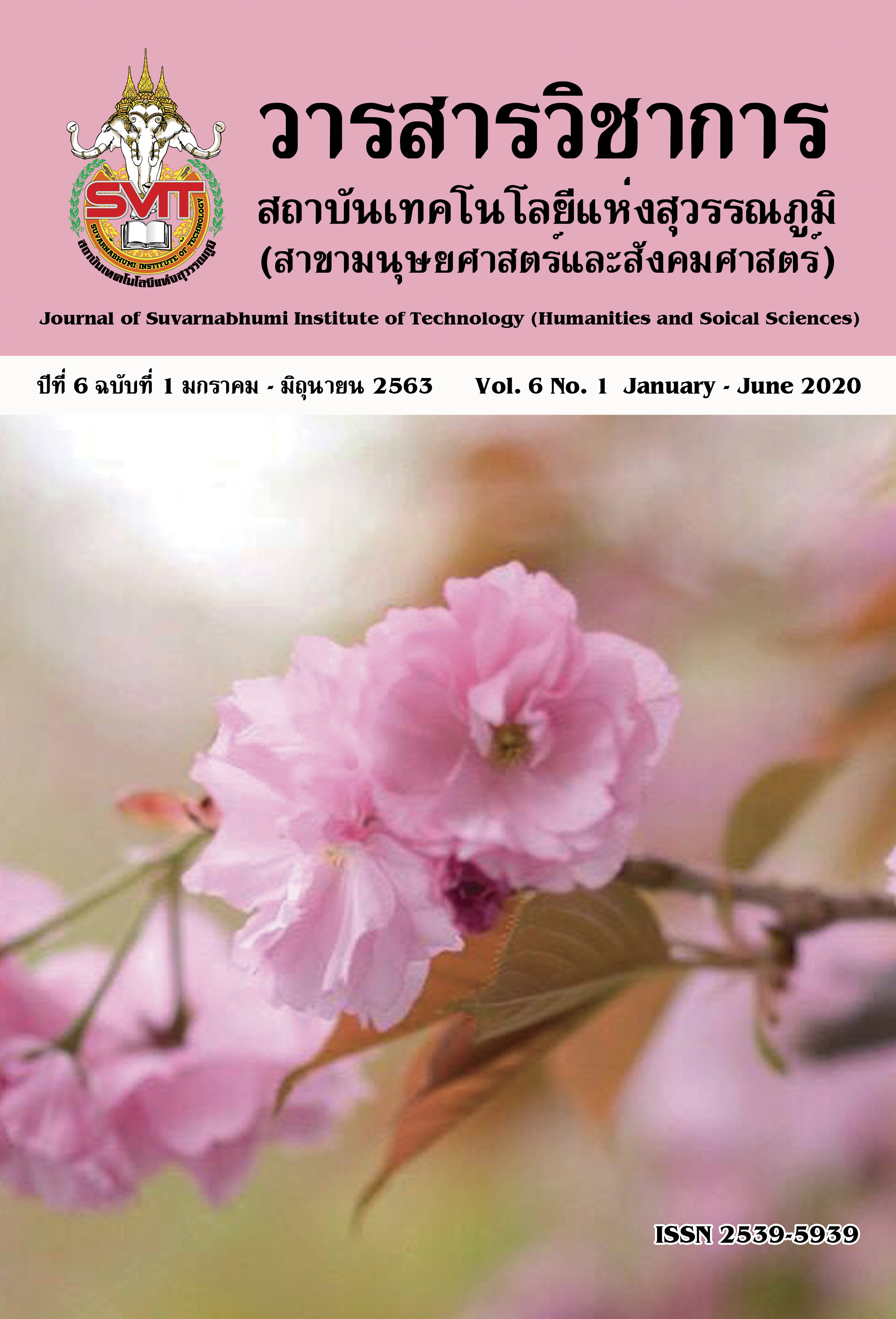THE 21st CENTURY LEARNING SKILLS FRAMEWORK AND PROJECT BASED LEARNING
Keywords:
the 21st Century Skills, Project Based Learning, Leaning ManagementAbstract
The learning management through project-based learning (PBL) is an activity that is centered on students and a systematic problem solving by integrating with the 21st century learning skills framework of Thai education 4.0. The objectives of this study are to explain the nature of teaching and learning by using the project based on student-center learning. The concept in this study aims to enable students to create knowledge by themselves and apply knowledge to create innovation to society.
In the project-based learning, there have some important components, namely 1) Creating an environment and stimulating the appetite in problems, 2) Learners create understanding and plan for learning, 3) Conclusion of learning results and knowledge creation, 4) To bring learning results into the expansion process and transform knowledge into innovation, and 5) Learning evaluation.
In summary, the results from the analysis showed that for the development of learners who focus on the 21st century learning skills framework through the project-based learning management, the skills required for the 21st century include: 1) life and career skills 2) Information, media, and technology skills 3) learning and innovation skills join with leaning design activities for improving learner's skills. In the 21st century learning skills framework through the project-based learning management, there are combined between teaching and learning management within four project patterns, namely 1) survey research project, 2) experimental research project, 3) development research project, and 4) theoretical research project. Therefore, Thai education has to include learning activities that allow students to take action through a variety of the project patterns. The learners can be able to apply knowledge from core subjects and combine with the important issues for the 21st century skills which focus on STEM education, namely science, technology, engineering and mathematics by integration with truly learning.
References
ทิศนา แขมมณี. (2553). ศาสตร์การสอน. สำนักพิมพ์แห่งจุฬาลงกรณ์มหาวิทยาลัย : กรุงเทพมหานคร.
ทิศนา แขมมณี. (2554). ศาสตร์การสอน : องค์ความรู้เพื่อการจัดกระบวนการเรียนรู้ที่มีประสิทธิภาพ. แห่งจุฬาลงกรณ์มหาวิทยาลัย : กรุงเทพฯ.
ธงชัย สิทธิกรณ์ (2559). การออกแบบการเรียนรู้ในศตวรรษที่ 21. สืบค้นเมื่อ 15 มิถุนายน 2561 จาก http://www.birdkm.com/outside-classroom/outsideclass/newlearningc21
วรพจน์ วงศ์กิจรุ่งเรือง และ อธิป จิตตฤกษ์.(2554). ทักษะแห่งอนาคตใหม่ : การศึกษาเพื่อศตวรรษที่ 21. กรุงเทพฯ : สำนักพิมพ์ Open Worlds.
วิจารณ์ พานิช. (2555). วิถีสร้างการเรียนรู้เพื่อศิษย์ในศตวรรษที่ 21. กรุงเทพฯ : มูลนิธิสดศรี – สฤษดิ์วงศ์.
วิชยานนท์ สุทธโส. (2558). การพัฒนาข้อเสนอแนะเชิงนโยบายบริบทอาเซียนในทศวรรษหน้า (พ.ศ. 2556-2565). วิทยานิพนธ์ระดับดุษฎีบัณฑิต. มหาวิทยาลัยศิลปากร.
สำนักงานคณะกรรมการการอุดมศึกษา กระทรวงศึกษาธิการ. สำนักงานคณะกรรมกการพัฒนาการเศรษฐกิจและสังคมแห่งชาติ. (2557). แผนพัฒนาเศรษฐกิจและสังคมแห่งชาติ ฉบับที่ 11 (พ.ศ. 2555- 2559) สืบค้นเมื่อ 22 กรกฎาคม 2561.จาก www.nesdb.go.th/Portals/0/news/plan/p11/ plan11 .pdf
สุทธิพร จิตต์มิตรภาพ. 2553. การเปลี่ยนแปลงโลกของการเรียนรู้ในศตวรรษที่ 21 และการพัฒนาสู่ “ครูมืออาชีพ” ใน สุดาพร ลักษณียนาวิน (บรรณาธิการ). 2553. การเรียนรู้สู่การเปลี่ยนแปลง. สมาคมเครือข่ายการพัฒนาวิชาชีพอาจารย์และองค์กรอุดมศึกษาแห่งประเทศไทย.
อดุลย์ วังศรีคูณ. (2557). การศึกษาไทยในศตวรรษที่ 21: ผลผลิตและแนวทางการพัฒนา.
Kare, Letrud. (2012). “A Rebuttal of NTL Institute’s Learning Pyramid”. Journal of Education. 133(1).
Deepa, Prahalad. (2011). “Design Lessons from the Consumer at the Bottom of the Pyramid”. Harvard Business Review. MAY 17, 2011.
Downloads
Published
Issue
Section
License
Copyright (c) 2020 Suvarnabhumi Institute of Technology

This work is licensed under a Creative Commons Attribution-NonCommercial-NoDerivatives 4.0 International License.
The articles published are copyrighted by the Sarasas Journal of Humanities and Social Science. The opinions expressed in each article in this academic journal are those of the individual authors and do not reflect the views of Sarasas Suvarnabhumi Institute of Technology. The authors are solely responsible for all aspects of their respective articles. Any errors or inaccuracies in the articles are the sole responsibility of the authors.



